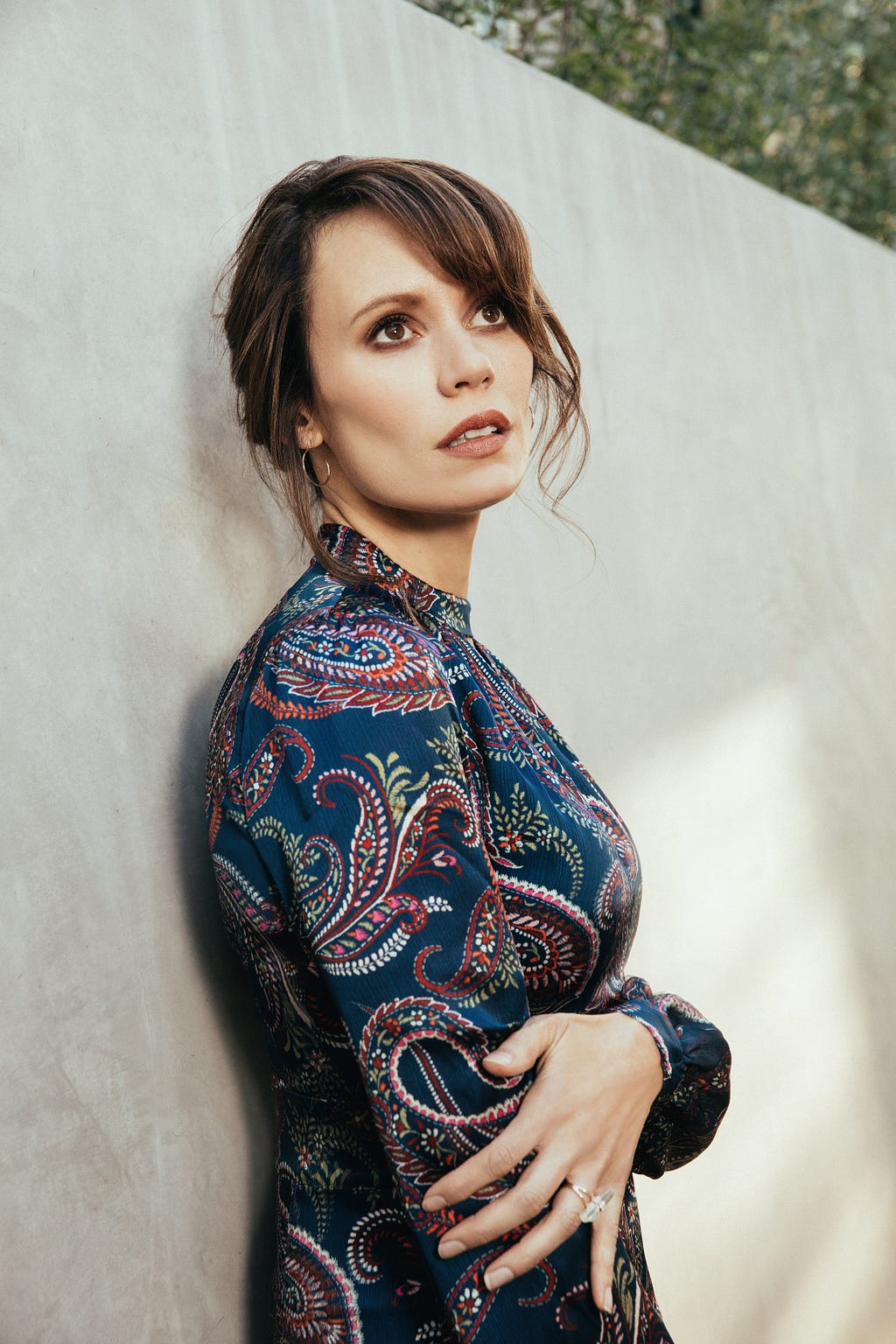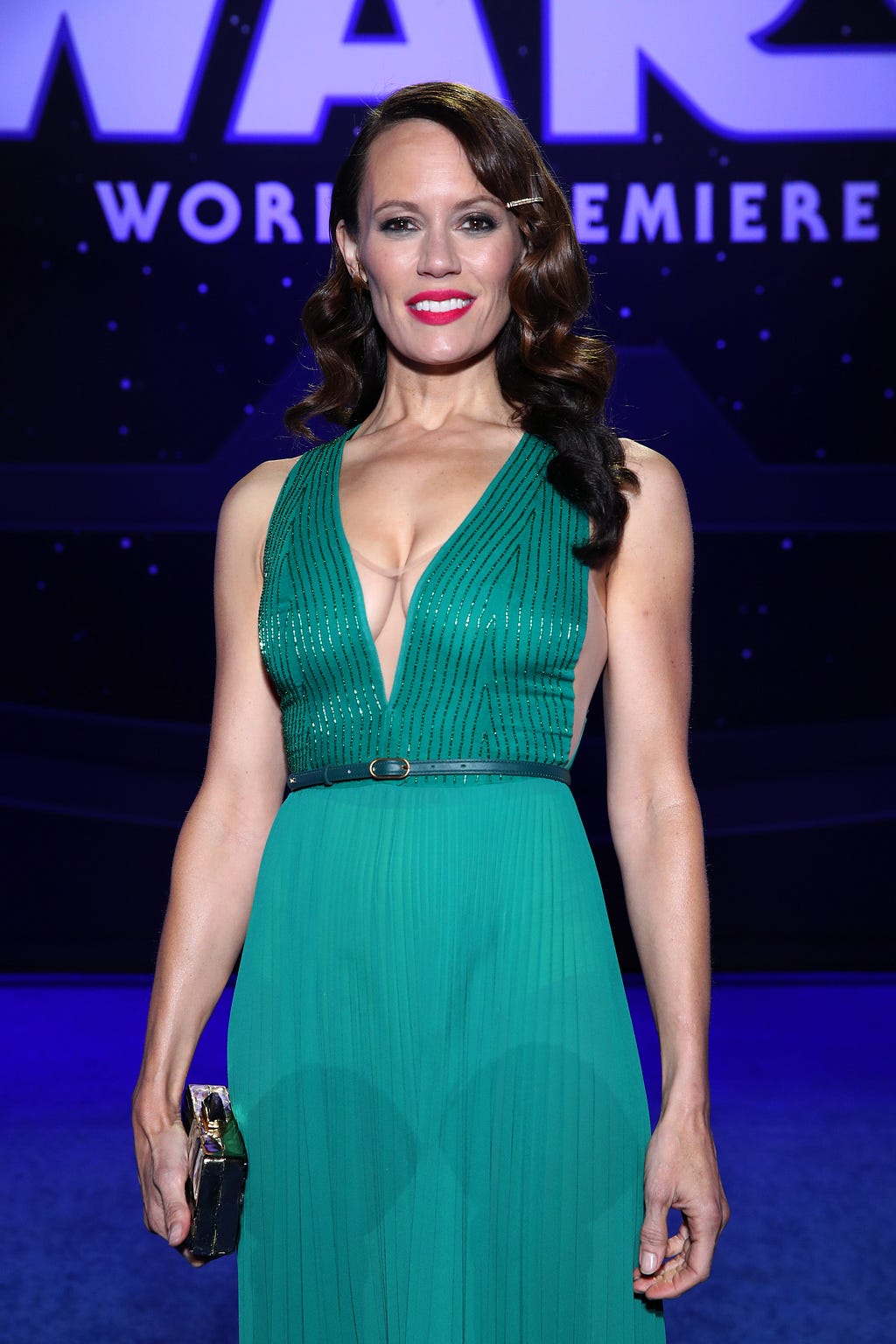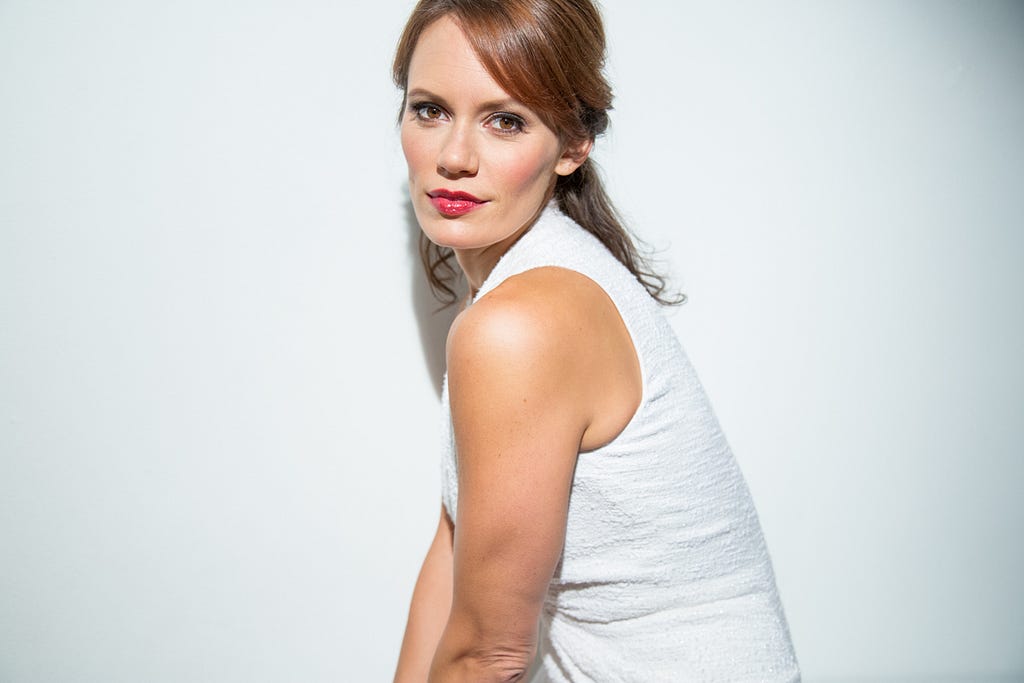Interviewed By Yitzi Weiner, Edited By Kelly Reaves

“You need to be willing to totally mess up. You need to be willing to fail. Otherwise, (A) You’re going to be totally bored out of your mind as an actor, and (B) You’re going to be boring. You’re not going to be interesting to work with, and you’re probably not going to get cast very much. You’re not going to last very long in this field. So you have to be willing to fail.”
I had the district pleasure to interview Emily Swallow. Emily is best known for her role as The Armorer in the Star Wars series The Mandalorian. She also played Kim Fischer on The Mentalist and Amara / The Darkness in the 11th season of Supernatural. Emily also appears as Emily in the video game The Last of Us Part II.
Thank you so much for doing this with us Emily! Our readers would love to get to know you a bit better. Can you tell us the story of how you grew up?
I was raised with a love for art, specifically music. My parents were wonderful, both amateur musicians. So I started performing at an early age with my friends. My cousins, friends, and I would make these music videos. I also sang in the church choir, but it was not something on my radar as a career, mostly because I didn’t know anyone else who did that. So it didn’t seem realistic to me.
I was interested in so many things, so music wasn’t something I thought I definitely wanted to do, but I always loved performing. I continued to sing in the choir and did plays and musicals at school. I was always encouraged by my parents. They were supportive. My dad was always in the back with the video camera recording every performance.
I went to the University of Virginia. I was fortunate enough to go to a college that had a wonderful drama department. I was not a drama major, and fortunately, it was one of those schools where you didn’’t have to be a drama major to be heavily involved. So I split my time between doing plays and taking some acting classes while being involved with a lot of other stuff.
I majored in Middle Eastern studies and foreign affairs. I thought I would go into the state department and work for the foreign service. However, I found myself devoting more and more of my time to the drama department. I don’t think I was even conscious of it. I tell people that I think this career path and vocation chose me. I had to get to a point where I was brave enough to really claim it and say: “This is what I want to do.” There certainly comes the point where you have to claim it. Otherwise, it isn’t going to do you any favors. There’s plenty of rejection in this industry, and you do have to say: “This is where I want to be for better or for worse.”
I had wonderful, encouraging teachers, and even my thesis advisor in my decidedly non-drama major was supportive. Every time I did a play, he would come to see it. Finally, during my last year, I had an acting teacher who said, “you seem to really love this. Have you ever considered pursuing this as a career?” And I said, “I guess maybe…” and he encouraged me to look at graduate acting programs and to really focus on it before just jumping into the career aspect of it. MFA training is not for everybody, and there are so many different ways into this life. But I knew that I craved that deeper focus.
I knew enough to know that I couldn’t just rely on the instincts I had. I wanted to have a more complex toolbox to choose from.. I needed more to draw from because I’d already encountered a few roles that left me baffled. I needed more skills to use when I encountered a character that was far from me.
I auditioned for a bunch of different schools. I had like 12 monologues that I could do at the drop of a hat. I got into NYU immediately out of undergrad, which may or may not have been the best thing because it was a hard transition to go from a very rigorous academic mindset immediately into an arts conservatory. Most of the people in my class had been out for a few years and knew more specifically what they wanted out of conservatory training. It finally got to the point where I knew with sureness that this was what I wanted to do. I have been fortunate enough to keep doing it. Doors have continued to open. I love what I do, even when it doesn’t love me back. It’s been an adventure.
That’s wonderful. You have a really interesting career. Can you share with us one of the most interesting stories that happened to you since you started your career?
I feel like there have been so many interesting things. I think what has been so interesting to me is the unexpected opportunities that have come up. There will be a role that I think I’m so perfectly right for, and then that job passes me by, and something that wasn’t even on my radar pops up.
I have been asked so many times how I wound up in “The Mandalorian.” It’s so funny because people will ask: “How did you decide to do “The Mandalorian”? Which makes it sound like I said: “You know what? I’d like to be in a “Star Wars” project.” To be honest, the audition for “The Mandalorian” was so low-key and kind of boring, and I don’t mean that in an insulting way at all. I make sure I tell people that I audition for at least 100–200 things a year, and I prepare for every single one of those auditions with the same amount of effort. I work hard. I am proud of my work. I go in, do my best, and then I sort of forget about it because afterward, you don’t hear anything at all about the role for a long time. It could be weeks. It could be months. It could be that you never hear about it.
With this particular audition, I knew it might have something to do with “Star Wars”, but it was really shrouded in mystery, and I didn’t know what it was. The audition was with the casting associate. There wasn’t anyone else in the room who was associated with the project. I remember I talked about my wedding with the casting associate who was also about to get married.
Then I got the call asking if I wanted to be involved with it. They said: “It is a “Star Wars” live-action thing. We don’t really know how many episodes the character is going to be in. We don’t quite know what this part is, but we wanted to have you involved. Are you interested?”
I was like: “Well, of course! It’s Star Wars!” Even though I didn’t really even know what it was. Looking back on that, it is just mind-blowing to me now, seeing what it is. It’s so funny whenever people ask me about the audition. I can see why they would assume it must have been this nerve-wracking thing because I must have known that I was going into an audition for this amazing character. I had no idea. It was so completely not nerve-wracking because I had no reason to believe that it was anything special, but I loved that because I had no chance to get nervous.

So, Emily, it’s been said our mistakes can be our greatest teachers. Can you share a story about a funny mistake you made when you were first starting out and what lesson you learned from that?
Yes. Well, it’s funny in hindsight, but it wasn’t funny at the time. I definitely look back and laugh at it now, though. I have an older brother. He’s seven years older than me, and he was always and continues to be very charismatic and charming. He was like a superstar athlete and super easygoing. I was a lot shyer when I was a kid and not athletic. I am more so now, but I think I sort of rebelled against that when I was little because I didn’t want to do what my brother did. I sort of took to being very academic and studious as a way to distinguish myself. I saw that if I studied really hard and got good grades, I got rewarded for that. That was the way I pursued success in school and then went straight from undergrad and that academic mindset into a conservatory.
I was trying to figure out the “right” way to do things, the way to get approval, and I totally got called out on that. I got put on probation. They said: “Look, you’re trying to figure out the right way to do things. You’re trying to figure out what we want.” I typically think putting somebody on probation is usually like a disciplinary thing, but I think they did that to throw me off balance, which was exactly what I needed and it did the trick! I was like: “What, what do you mean? What did I do wrong? How on earth could I be put on probation? This is so unfair!”
When they said: “You need to be willing to totally mess up. You need to be willing to fail. Otherwise, (A) You’re going to be totally bored out of your mind as an actor, and (B) You’re going to be boring. You’re not going to be interesting to work with, and you’re probably not going to get cast very much. You’re not going to last very long in this field. So you have to be willing to fail.” I didn’t know what that meant. They told me to figure it out. That was something I needed to hear both as an actor and in life because there were people who were encouraging me to be an actor for a very long time until I finally embraced it and said, okay, yes, this is what I want to do.
When I was younger, I waited until other people gave me permission or approval to do something. I really needed to learn that that keeps you pretty confined, and it certainly doesn’t work in this career. It doesn’t work in life, either. It keeps you in a very safe space that I think will wind up leading you to feel restless, resentful, and pretty unhappy because you’re always wondering what else is out there, knowing there’s something else you should be doing. I knew I had more potential than I was reaching for. I think it led to having this feeling that I was letting myself down.
There are so many lessons I get to learn from being an actor and from the characters I play. I’m incredibly grateful for that, but that was one of the first lessons I learned right out of the gate. I’m so glad that they called me out on that. Being put on probation threw me off balance. I just remember being so shocked and thinking, this is so unfair, but it was exactly what I needed.
That’s a great story. So this is our signature question: What are the five things you wish someone had told me when I first started and why?
Oh, man! There are so many things people probably did tell me that just didn’t resonate with me at the time. There are things you can be told that you just can’t learn until you experience them. One of them is definitely that you have to find a way to be comfortable with rejection. That’s something I’m still learning because this is, on many levels, a business of rejection. It doesn’t mean failure, and logically, that doesn’t make sense. I do not get most of the jobs I audition for, and logically speaking, that’s sort of insane. Who pursues a career where the rejection rate is higher than the success rate? But that’s just the name of the game. Until I’d been doing it for a few years, I didn’t understand that I needed to find a way to really contend with that.
I heard it and understood it intellectually, but I didn’t understand the emotional toll that that would take. I was always like: Okay, I didn’t get that role. Gotta move on. I’m very much a problem solver, a fixer, and I didn’t let myself feel like that was really impacting me. I wish someone had told me I was really going to have to acknowledge it and find a way to move through it — let the feelings move through me and then move on from it. Don’t dwell on it. I don’t think most people can just turn it off because, as actors, we invest in every single character that we spend time with, even if it’s just for an audition. It’s almost like a relationship that ends, and you put yourself out there, and then you get rejected, and you have to grieve it for at least a few minutes. I wish someone had encouraged me to figure out a healthy process for doing that.
I also wish someone had told me early on how important it was to have my own rehearsal process for TV and film. It was really jarring for me coming from the theater, where you do preparation on your own for sure, but then you have the luxury of working with your cast and director for quite some time before facing an audience. Because of the constraints of time, you have to do all of these rehearsals on your own before you ever get to set for TV and film.. I was so used to having a framework that was built into the process, and I love that about theater. I love getting to collaborate with people. You can sort of create that on your own for TV and film, but it’s very different.
People did tell me to leave more time to get to auditions. I wish I’d listened to that. I can’t tell you how much stress I created for myself early on, in New York and in LA, not leaving enough time. I would say, Okay, my audition is at noon. I need to get there at noon, and that’s not true because you have to leave time for parking and very often they’re running late. You’re not going to be seen at your time, but then those times that you are going to be seen at your time, you have to give yourself time to gather your thoughts and prepare.
Another thing I learned is such a simple thing. Some of the most talented genius actors, their advice is: show up on time and know your lines. The preparation is really that basic. You have to have the structure and foundation down pat, so you can have room for the genius to show up because if you’re feeling agitated and rushed that’s what you’re going to be distracted by.
I also think for a few years, I wanted to be everything to everyone and so I went in for every single possible audition that came up. I got burnt out that way. I’m fortunate to fit into a lot of different types, so there are a lot of auditions that came my way, but that also meant I was working on a lot of different things that I wasn’t necessarily right for or that probably weren’t going to happen. I sort of burnt myself out that way. I was spending all of my time working on auditions at the expense of my personal life. I thought I would do it until I got that one part that’s going to make it easy, and I’m not going to have to do this anymore. I don’t think that that ever really happens. I think you’re always working. There are maybe a select few people who get to that point of celebrity and power where they can pick and choose, but most actors are always working at it.
I think I am much more honest about it now, what speaks to me and what I really think I can do when I’m auditioning, but I wish that earlier on, I had been more selective earlier on.
The last thing that I wish someone had told me when I started out was that you will always get to go back to craft services another day. You don’t have to eat everything at once. It’s insane how much is there. It’s a cornucopia of magical snacks.

That’s great. I want to respect your time, so here’s our last question: You have really impressive work, and you’re really excited about “The Mandalorian.” What are some of the other exciting projects you’re working on now, and what do you see yourself working on in the future?
I am doing a play in Los Angeles. It’s a reimagined production of ‘King Leer’. We’ve cut some characters and rearranged some of the structure of the play. We are integrating some inventive audio and video elements.
I love doing theater. I love the rehearsal process. I love how it moves so much more slowly and subtly in terms of building the final product. You have the chance to see things marinate and brew in a way that you just don’t with TV and film because of the pace at which things happen with those mediums. I love the collaboration and how deeply you get to know the other actors, the designers, and the creative team, and the trust built on that.
I’m working with six other actors who are just wonderful, including Joe Morton, who’s playing King Lear. We actually worked on stage together four years ago on a production of ‘Henry the IV’ with Tom Hanks, but Joe and I didn’t have any scenes together. So it’s sort of bizarre seeing that I don’t do theater very often, and I happened to do another play with him. Now I get to do scenes with him. He plays my father.
I learn so much when I do theater, especially when I get to do something with someone like him. He’s so generous, so giving, and such an incredible actor. He’s just so in the moment, every time, every performance. We are doing that through June 5th. So if anyone is in LA and wants to come to see it, please do.
How can our readers further follow your work online?
My Instagram is the main one that I keep up with, and that’s @bigeswallz, I also have a Facebook fan page. That’s EmilySwallowFans.
Amazing. Emily, thank you so much for your time. I’m really excited to share your story with our readers. I’m confident your star is going to rise vertically very soon.
Thank You.
Mandalorian Star Emily Swallow On The Five Things You Need To Shine In The Entertainment Industry was originally published in Authority Magazine on Medium, where people are continuing the conversation by highlighting and responding to this story.
